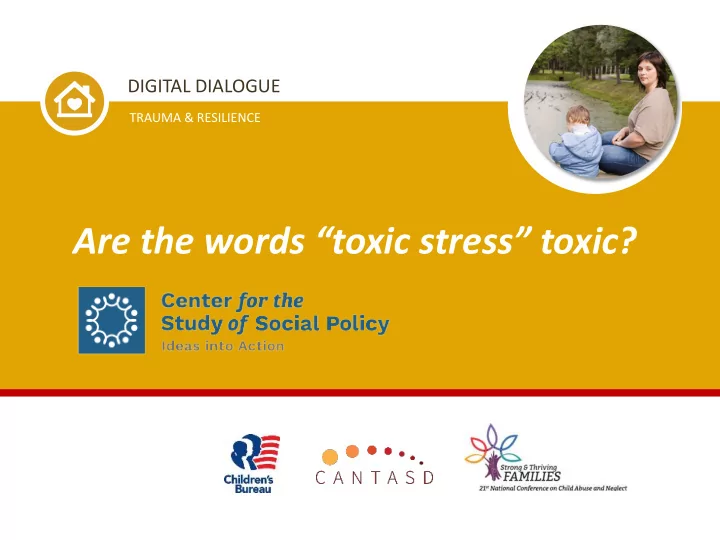

DIGITAL DIALOGUE TRAUMA & RESILIENCE Are the words “toxic stress” toxic?
Speakers Join the National Conversation PRESENTER on Child Abuse Cailin O’Connor and Neglect Senior Associate Center for the Study of Social Policy MODERATOR Jean Swift Project Director CANTASD cantasd.acf.hhs.gov
Positive Stress While some stress Moderate and brief. When a young child is is normal and can protected by supportive relationships with adults , she learns to cope with everyday have a positive challenges and her stress response returns to effect, severe baseline. Example: sports chronic stress can Tolerable Stress trigger a toxic Occurs when more serious difficulties, such as stress response. the loss of a loved one, a natural disaster, or frightening injury, are buffered by caring adults . Example: death of a relative Toxic Stress Learn more: Center on the When strong, frequent or prolonged adverse Developing Child experiences such as extreme poverty or repeated http://developingchild.harvard.edu/ abuse are experienced without adult support , a physiological “toxic stress response” can occur.
* Knowledge about the impact of early trauma and toxic stress is expanding
Join the National Conversation Risk factors on Child Abuse and Neglect are not predictive factors because of protective factors. cantasd.acf.hhs.gov
What do you associate with the word “toxic”? Join the National Conversation on Child Abuse and Neglect Unfixable cantasd.acf.hhs.gov
What words should be anchoring our work with families? Join the National Conversation on Child Abuse and Neglect Inequality Protective factors cantasd.acf.hhs.gov
Trauma and Toxic Stress: Shifting the Conversation • It needs to be about more than understanding and Join the National Conversation intervening. It’s equally important to: on Child Abuse and Neglect Tackle root causes of stress. Help parents and caregivers buffer their children from toxic stress responses. Build protective factors in families and communities. Celebrate, research, and promote resilience and thriving. Build community-level strategies to support families, reduce and address adversity, and promote healing. cantasd.acf.hhs.gov
https://www.wvaces.org/
Join the National Conversation on Child Abuse and Neglect Discussion • Please type questions into the chat box cantasd.acf.hhs.gov
Resources Join the National • A Guide to Toxic Stress: Conversation on Child Abuse https://developingchild.harvard.edu/guide/a- and Neglect guide-to-toxic-stress/ • Working Toward Well-Being: Community Approaches to Toxic Stress: https://cssp.org/resource/working-toward-well- being-community-approaches-to-toxic-stress-2/ • Strengthening Families Protective Factors Framework: https://cssp.org/our- work/project/strengthening-families/ • West Virginia ACEs Report: https://www.wvaces.org/ cantasd.acf.hhs.gov
WE CAN – Work to End Child Abuse and Neglect Join the National Conversation We invite you to share these on Child Abuse posts and use them in your and Neglect own materials. Follow us: facebook.com/cantasd twitter.com/cantasdcenter Hashtags: All of the graphics are available for download on #WECANPreventChildAbuse the CANTASD website: #NCAPM2019 https://cantasd.acf.hhs.gov/ we-can/ #PreventionMonth cantasd.acf.hhs.gov
21 st NCCAN Join the National Conversation on Child Abuse and Neglect 21 st National Conference on Child Abuse and Neglect April 24—26, 2019 * Join us via Live-Stream! More information is available at nccan.acf.hhs.gov cantasd.acf.hhs.gov
Thank You & Next Steps Join the National • Download the handouts to learn Upcoming: Conversation more. Click on the files in the on Child Abuse April 11 th : Workforce “Handouts” box on your screen. and Neglect Well-being—Centering Yourself to Better Support Others • Do you have innovative ideas, questions or concerns about April 17 th : Integrating trauma and resilience? Tell us Mindfulness to Support Well-Being about your work. Send an e-mail and Resiliency for to hello@CANTASD.org with Those Working on “Trauma and Resilience” in the Child Abuse and subject line. Neglect NCCAN April 24-26 th • 3 Plenary Sessions • cantasd.acf.hhs.gov 5 Master Sessions
Recommend
More recommend